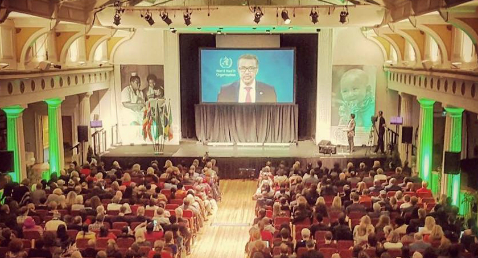The World Health Organization (WHO) is developping a...
5 October 2017
Building the health workforce of the future

This article was first published on the WHO website.
On 17 November 2017 the largest-ever forum focusing on health workers and global health concluded with a series of actions to prevent a projected shortfall of 18 million health workers. These have been laid out in the Dublin Declaration, agreed to by representatives of over 70 countries who attended the Forum.
Actions include setting up of an international fund, the Working for Health Multi-Partner Trust Fund (MPTF), to support countries expand and transform their health workforce.
“The Working for Health MPTF will enable partners to pool funding to provide the support needed to generate change at country level” said Jim Campbell, Director of the Health Workforce Department at the World Health Organization.
“It will be used to galvanise the efforts of pathfinder countries-those using innovative ways to build a fit for purpose health workforce- as well as priority countries- those struggling to provide access to health care and where the threat of emerging epidemics is greatest.”
The Working for Health programme is a collaboration between the International Labour Organisation, (ILO), the Organization for Economic Co-operation and Development (OECD) and the World Health Organization (WHO) to help countries expand and transform the global health and social service workforce. It was set up to carry forward recommendations made by the United Nations Secretary’s High level Commission on Health Employment and Economic Growth, which found that investing in the health workforce drives economic growth.
The Government of Norway has announced commitment to the MPTF. “Norway is committed to supporting the MPTF and urges other donors to invest in the Working for Health Programme. Investment in transformative education, skills and job creation is essential for tackling existing health emergencies, future health threats and ensuring the long-term sustainability of health systems.”
Another action at the Dublin Forum was a first consultation on mechanisms for establishing an International Platform on Health Worker Mobility to maximize benefits and mitigate adverse effects from the increasing rate and complexity of health labour mobility. This will be done through strengthened evidence, analysis, knowledge exchange and policy action, including strengthening and implementation of the WHO Global Code of Practice on the International recruitment of Health Personnel.
Forum delegates committed to making investments towards transformative health workforce education and the creation of decent jobs in the health sector, especially for women and youth. A special feature of the Dublin Forum was a Youth forum, recognizing that attracting and retaining young healthworkers is critical to averting the shortfall of 18 million healthworkers, and for transforming the health and social workforce. The Youth Forum agreed on their own call for action.
The Forum also committed to improving the safety and security of health workers by upholding international humanitarian law, strongly condemning violence, attacks and threats directed against medical personnel and facilities. Such attacks have long term consequences for the civilian population and healthcare systems of the countries concerned, as well as for the neighbouring regions.This was the fourth such forum held to examine needs, lessons learned and the way forward for the global health workforce. It was convened by Ireland’s Department of Health, Health Service Executive and Department of Foreign Affairs and Trade, the World Health Organization, Trinity College Dublin, and the Global Health Workforce Network.
